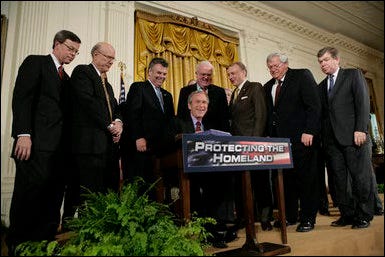This Day in Legal History: PATRIOT Act Introduced
On October 23, 2001, just six weeks after the September 11 terrorist attacks, the United States House of Representatives introduced H.R. 3162, the bill that would become the USA PATRIOT Act. Officially titled the “Uniting and Strengthening America by Providing Appropriate Tools Required to Intercept and Obstruct Terrorism Act,” the legislation represented one of the most significant expansions of domestic surveillance and law enforcement powers in modern U.S. history. The bill was drafted rapidly, largely by the Department of Justice under Attorney General John Ashcroft, and was introduced with bipartisan support.
Key provisions of the act included expanded authority for wiretaps, the ability to access business and personal records through National Security Letters, and increased surveillance of internet and email communications. Section 215, in particular, allowed the government to obtain “any tangible things” relevant to a terrorism investigation, a phrase later scrutinized for its vagueness. Civil liberties organizations quickly raised concerns about the law’s impact on privacy, due process, and the Fourth Amendment’s protection against unreasonable searches.
Despite these objections, the bill moved swiftly through Congress. The House passed it on October 24, and the Senate followed on October 25. President George W. Bush signed it into law on October 26, 2001. In the years that followed, the PATRIOT Act would become a focal point in debates over national security versus individual rights, particularly as revelations of mass surveillance by the NSA surfaced in the 2010s.
Some provisions were later challenged in court, amended by Congress, or allowed to expire. Nevertheless, the PATRIOT Act reshaped the legal framework for counterterrorism in the U.S., leaving a legacy still felt in debates over surveillance, transparency, and executive power today.
Several major lobbying firms in Washington, D.C., posted record or near-record revenues in the third quarter of 2025, driven by policy shifts under President Donald Trump and rising client demand for regulatory guidance. Ballard Partners led the surge, reporting a 400% year-over-year increase and nearly $25 million in lobbying revenue. Other top performers included BGR Group ($19.1 million), Brownstein Hyatt Farber Schreck ($18.9 million), Holland & Knight ($13.9 million), and Hogan Lovells ($4.4 million), each claiming their best quarter yet.
The increase in lobbying activity was largely fueled by the Trump administration’s aggressive moves on tariffs, trade, and the implementation of a sweeping tax-and-spending bill signed in July. Lobbyists noted that even during the early October government shutdown, regulatory deadlines such as public comment periods on tariffs kept work moving. Akin Gump reported $16.3 million, its best third quarter ever, and K&L Gates earned $5.4 million.
Overall lobbying expenditures have continued to climb, with companies spending over $2.53 billion by late July 2025. Industries like pharmaceuticals, health products, and tech accounted for a significant share of that spending, reflecting ongoing regulatory and legislative uncertainty.
Lobbying firms record 3rd quarter gains amid Trump policy shifts | Reuters
Paul Ingrassia, nominated by President Donald Trump to lead the U.S. Office of Special Counsel, withdrew from consideration after losing Republican support in the Senate. He announced his withdrawal ahead of a scheduled confirmation hearing, citing an insufficient number of GOP votes. The Homeland Security and Governmental Affairs Committee had already postponed a prior hearing in August amid growing concerns.
Senate Republicans distanced themselves from Ingrassia after Politico published alleged chat messages from him. His connections to controversial figures — including his legal work for Andrew Tate and attendance at a rally for White nationalist Nick Fuentes — drew additional scrutiny. Senator Thom Tillis labeled him “unfit to serve,” and Majority Leader John Thune confirmed the nomination was unlikely to move forward.
The Office of Special Counsel plays a crucial role in enforcing civil service protections, particularly amid Trump’s push to reshape the federal workforce. It also oversees Hatch Act compliance, which limits political activity by federal employees. With the Merit Systems Protection Board now restored, a new nominee will be needed to confront upcoming legal battles over career employee protections.
Trump’s Special Counsel Nominee Withdraws After GOP Blowback
In Delaware court, tensions escalated between bidders and creditors over who should win control of Citgo Petroleum’s parent company, PDV Holding, as part of a court-ordered auction aimed at compensating creditors tied to Venezuela’s defaults and expropriations. The case, which has dragged on for eight years, now faces a decisive moment after three bidding rounds.
A $5.9 billion offer from Amber Energy, affiliated with Elliott Investment Management, has been recommended by the court-appointed auction officer. However, Citgo’s legal team and Venezuelan representatives argue the offer is too low, especially compared to a $7.9 billion bid from a Gold Reserve subsidiary. They also allege flaws in the auction process itself.
Amber’s bid includes a key side deal to pay $2.1 billion to holders of a disputed Venezuelan bond, making timing crucial since the agreement expires in early December. Gold Reserve, on the other hand, seeks to distribute more of the proceeds among a wider group of creditors, raising concerns over whether bondholders should benefit at all given unresolved legal questions about the bond’s validity.
Judge Leonard Stark also heard motions from Venezuela and Gold Reserve to disqualify him, court officer Robert Pincus, and two advisory firms over alleged conflicts of interest. The U.S. Treasury Department’s approval is still required to finalize the auction, and both the Maduro government and Venezuela’s opposition oppose the sale.
Bidders, creditors battle in US court over who should win Citgo auction | Reuters













